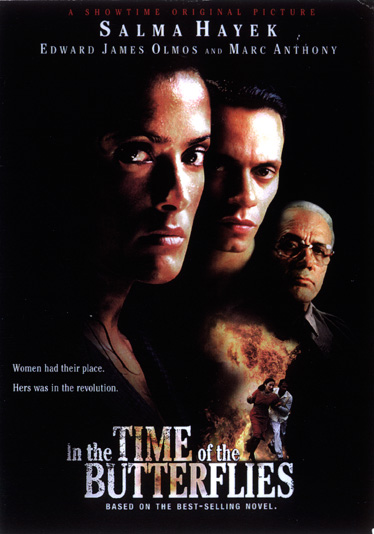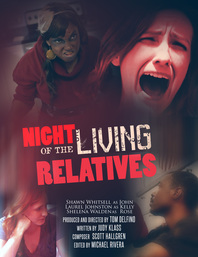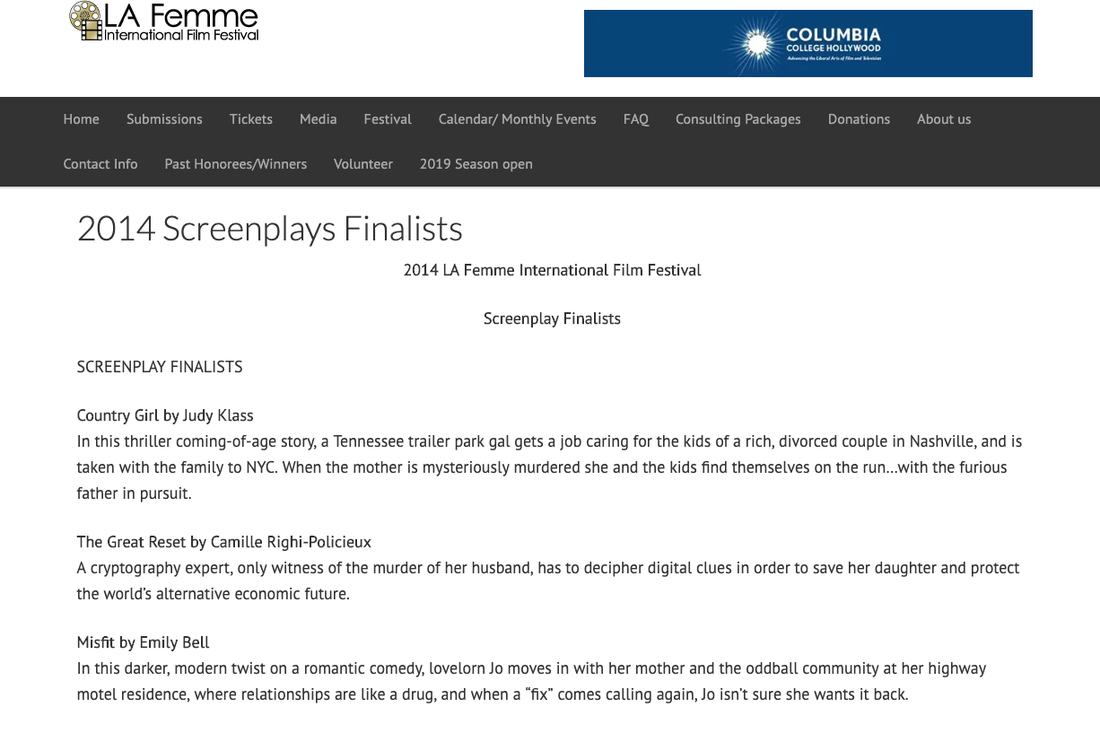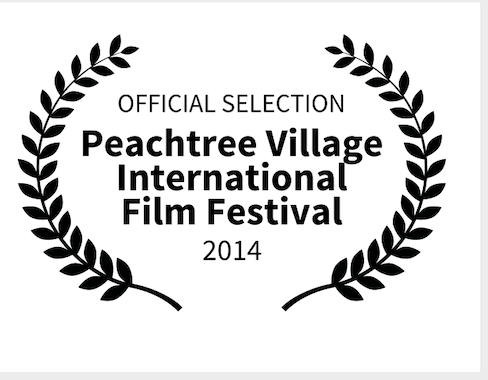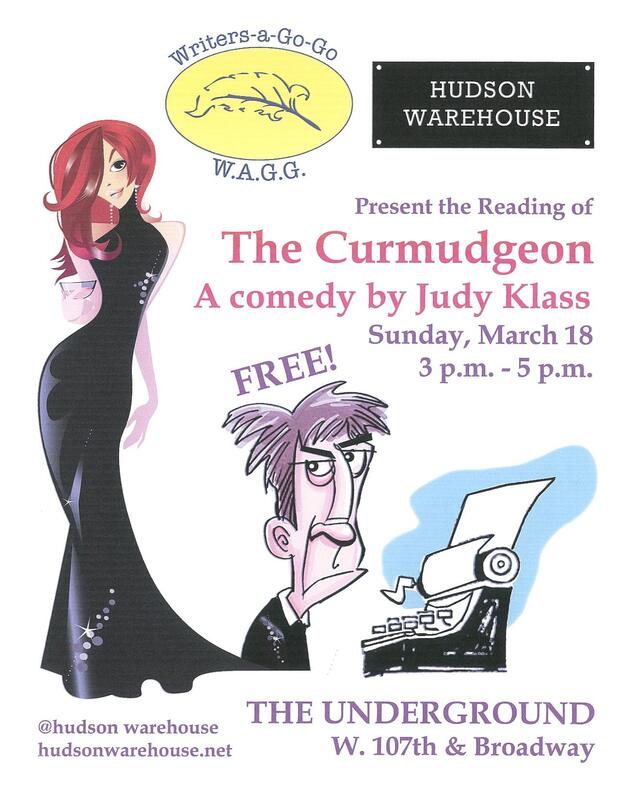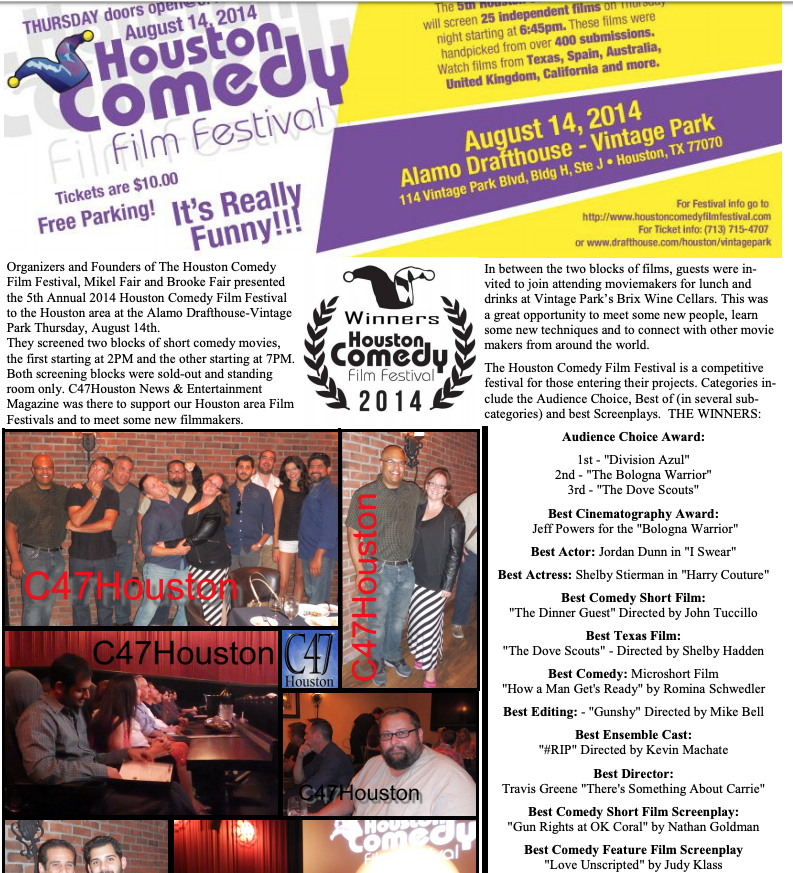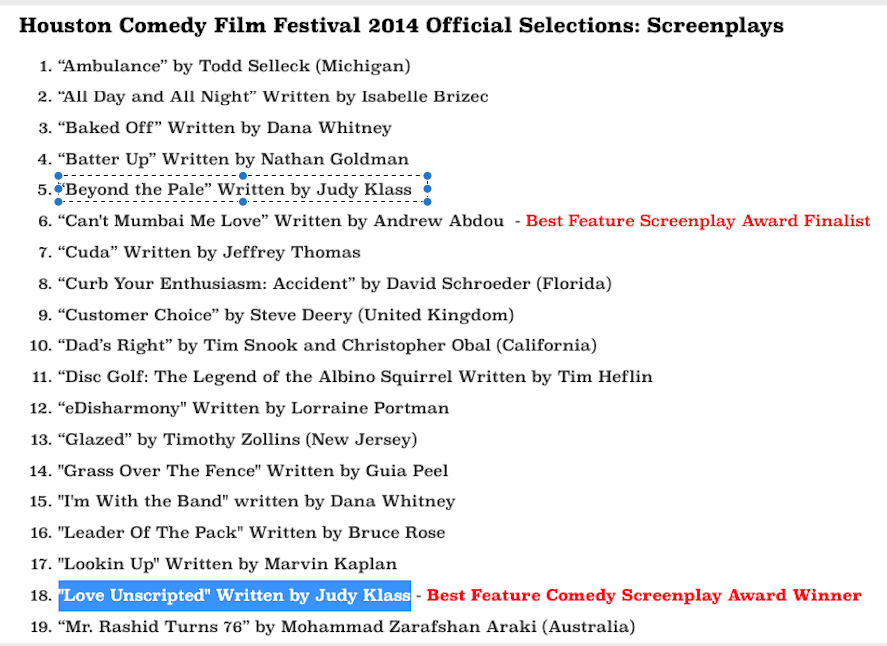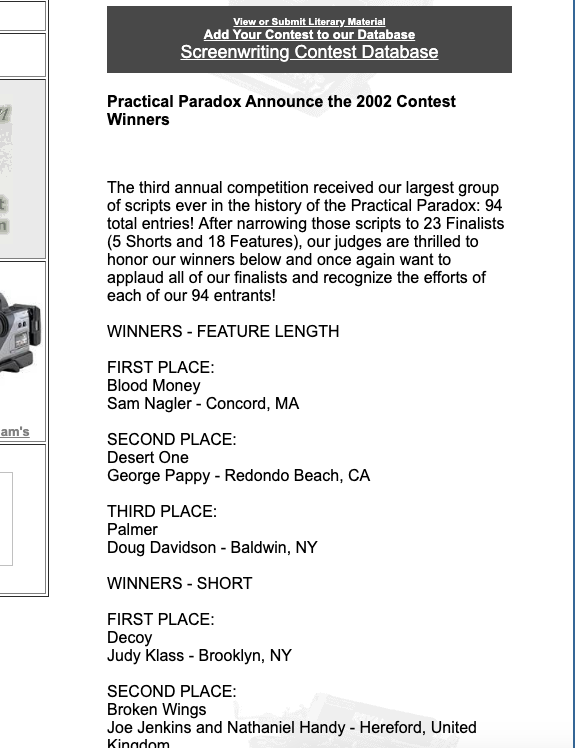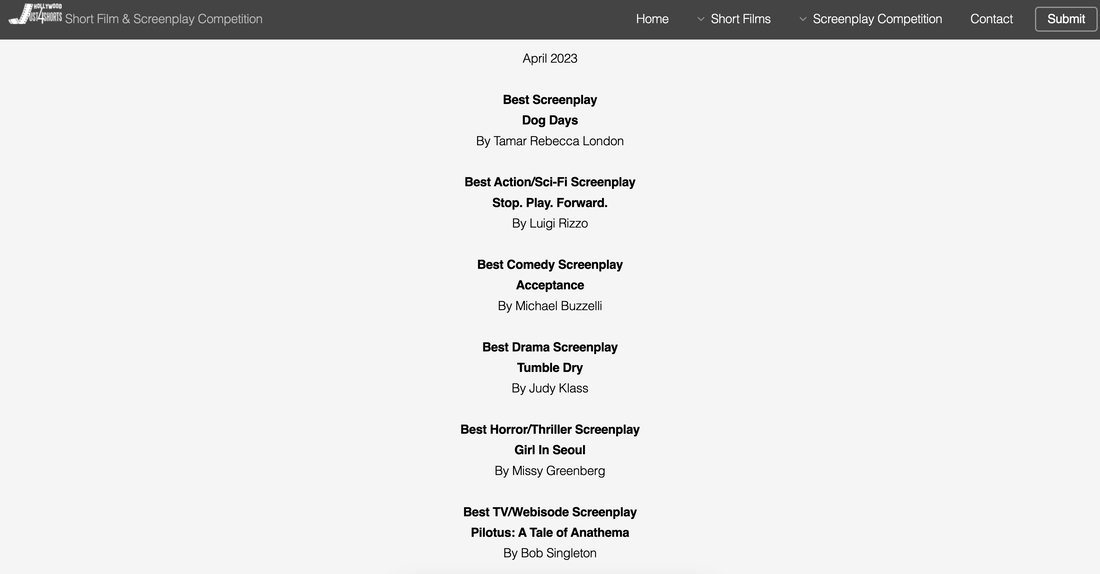|
Short screenplays of mine have been turned into films directed by film-makers Tristan Daws, Allan McCall -- and most recently, Tom Delfino turned the short screenplay version of my short zombie play NIGHT OF THE LIVING RELATIVES into a film that has played in festivals.
I got involved with the Intergalactic Space Rangers who put together radio shows -- and also animated sequences. Here is what they did with my sketch/short play OUT TO LUNCH: |
FEATURE-LENGTH SCREENPLAYS
I HEARD A RUMOR would be inexpensive to make: a romantic comedy set on a college campus. It riffs on Shakespeare's Much Ado About Nothing. Bea and Ben are smart, quirky, highly verbal juniors who bait and diss each other with such ferocity, their friends suspect a mutual attraction. The friends stage conversations for each of them to overhear, and when each believes the other is in love -- it's enough to make them admit how they feel. Meanwhile, a coked-out creep stalks Bea's shy, romantic freshman cousin who is embarking on her first relationship. The creep has a science nerd morph a home-made sex tape to make Bea's cousin appear to be the girl in the video, and shows it to her boyfriend. Outraged, the boyfriend publicly humiliates her, the distraught girl is harassed, ready to drop out . . . And Bea demands that Ben prove his love by helping her to fight back. This script was a WinFemme Winner and won Best Suspense/Drama Screenplay in the New York International Film & Video Awards.
LOVE, UNSCRIPTED is another low-budget college campus romantic comedy. Craig and Corinne are in a film-making class together, and dislike each other. Craig has a good camera and a good cinematic eye, but he has trouble with things like character development and dialogue. Corinne is a theater major and has a much better ear for that stuff, but her scripts are static, stagey and talky. Craig's parents are pressuring him to major in law. He proposes to Corinne that they combine their talents and write and direct a feature-length film together, to have one serious credit. They set out to make a romantic comedy with her as the female lead, but she hates his idea for the male lead (his wacky roommate) and he hates the pretentious theater guy she wants to use, and auditions they hold do not go well . . . Eventually, they play the two leads and fall for each other, for real. But Craig's roommate and another guy post footage of Corinne on social media that alienates her, and jeopardizes the film project as well the relationship . . . This is the script that won Best Comedy Feature Film Screenplay in the Houston Comedy Film Festival in 2014.
AU PAIR GIRL is essentially The Hand That Rocks the Cradle in reverse -- because teenage nannies are not actually the ones in a position of power. Janine hangs out with her ditsy friends and boyfriend Dan the summer before her senior year of high school. But her parents are angry she has not yet found a summer job. They arrange for her to au pair for a rich, unpleasant couple, Dr. and Mrs. Cargill, who take Janine with their family to their summer home on a semi-private island. Their little boy Kenny is wary of Janine at first -- because, she eventually learns, his full-time caretaker is having her first few weeks off in several years. Heather, his cold older sister, is dismissive of Janine. When she stumbles on some not-so-legal activities Dr. Cargill is involved in, Janine's cell phone disappears, she cannot get help from the other few homes on the island, and she winds up running into the woods. When her phone goes dead, Dan rows out to find her, and they find each other and spend a very scary, sometimes romantic night, being hunted by the Cargills all over the island. See my Prose & Poetry page for info about the YA book version of AU PAIR GIRL. (Script optioned four times in Hollywood.) This script was an Official Selection of the Fresh Voices Screenplay Competition in 2015. Director Dan Herzog now has it under option.
COUNTRY GIRL also riffs on the teen nanny theme. Kaitlyn lives in a trailer park with her often-drunk mother in a town in Tennessee about an hour outside of Nashville. Her boyfriend Cory works on Music Row. He gets her a summer job nannying for Gavin Wakefield, his rich, impatient employer; the Gavin and his wife have split in an ugly divorce, and someone needs to live at the house with her and the kids. Kaitlyn is dazzled to be in Nashville! The three kids are snooty at first, but she wins them over, partly by playing songs on her guitar that she and Cory have written. Gavin comes by on a day that his not his visitation day and he and his ex have a loud, violent, hideous confrontation. After he leaves, she decides the kids won't be there when he comes for visitation the next day; she flies with her kids and Kaitlyn (who has never been on a plane) to NYC and they stay at the Plaza. Kaitlyn is even more dazzled. The kids show her around the city where they used to live, Alyssa the older girl calls her father and says where they are, they meet their mom at Columbus Circle -- and a car comes up on the curb and kills the mom in a hit and run. Gavin has flown to the city but had not arrived yet when it happened. But Alyssa tells Kaitlyn she believes her father was behind it -- and she and the other kids do not want to be in his custody. Now, Kaitlyn finds herself on the run in a strange city, with no money and three kids listed in an Amber alert, with the police and a very angry father chasing after them -- and Cory, unable to fly out during a terrible storm, driving frantically to NYC to find them. This script was a finalist in the LA Femme International Film Festival in 2014. And it was an Official Selection of the Fresh Voices Screenplay competition in 2015.
I HEARD A RUMOR would be inexpensive to make: a romantic comedy set on a college campus. It riffs on Shakespeare's Much Ado About Nothing. Bea and Ben are smart, quirky, highly verbal juniors who bait and diss each other with such ferocity, their friends suspect a mutual attraction. The friends stage conversations for each of them to overhear, and when each believes the other is in love -- it's enough to make them admit how they feel. Meanwhile, a coked-out creep stalks Bea's shy, romantic freshman cousin who is embarking on her first relationship. The creep has a science nerd morph a home-made sex tape to make Bea's cousin appear to be the girl in the video, and shows it to her boyfriend. Outraged, the boyfriend publicly humiliates her, the distraught girl is harassed, ready to drop out . . . And Bea demands that Ben prove his love by helping her to fight back. This script was a WinFemme Winner and won Best Suspense/Drama Screenplay in the New York International Film & Video Awards.
LOVE, UNSCRIPTED is another low-budget college campus romantic comedy. Craig and Corinne are in a film-making class together, and dislike each other. Craig has a good camera and a good cinematic eye, but he has trouble with things like character development and dialogue. Corinne is a theater major and has a much better ear for that stuff, but her scripts are static, stagey and talky. Craig's parents are pressuring him to major in law. He proposes to Corinne that they combine their talents and write and direct a feature-length film together, to have one serious credit. They set out to make a romantic comedy with her as the female lead, but she hates his idea for the male lead (his wacky roommate) and he hates the pretentious theater guy she wants to use, and auditions they hold do not go well . . . Eventually, they play the two leads and fall for each other, for real. But Craig's roommate and another guy post footage of Corinne on social media that alienates her, and jeopardizes the film project as well the relationship . . . This is the script that won Best Comedy Feature Film Screenplay in the Houston Comedy Film Festival in 2014.
AU PAIR GIRL is essentially The Hand That Rocks the Cradle in reverse -- because teenage nannies are not actually the ones in a position of power. Janine hangs out with her ditsy friends and boyfriend Dan the summer before her senior year of high school. But her parents are angry she has not yet found a summer job. They arrange for her to au pair for a rich, unpleasant couple, Dr. and Mrs. Cargill, who take Janine with their family to their summer home on a semi-private island. Their little boy Kenny is wary of Janine at first -- because, she eventually learns, his full-time caretaker is having her first few weeks off in several years. Heather, his cold older sister, is dismissive of Janine. When she stumbles on some not-so-legal activities Dr. Cargill is involved in, Janine's cell phone disappears, she cannot get help from the other few homes on the island, and she winds up running into the woods. When her phone goes dead, Dan rows out to find her, and they find each other and spend a very scary, sometimes romantic night, being hunted by the Cargills all over the island. See my Prose & Poetry page for info about the YA book version of AU PAIR GIRL. (Script optioned four times in Hollywood.) This script was an Official Selection of the Fresh Voices Screenplay Competition in 2015. Director Dan Herzog now has it under option.
COUNTRY GIRL also riffs on the teen nanny theme. Kaitlyn lives in a trailer park with her often-drunk mother in a town in Tennessee about an hour outside of Nashville. Her boyfriend Cory works on Music Row. He gets her a summer job nannying for Gavin Wakefield, his rich, impatient employer; the Gavin and his wife have split in an ugly divorce, and someone needs to live at the house with her and the kids. Kaitlyn is dazzled to be in Nashville! The three kids are snooty at first, but she wins them over, partly by playing songs on her guitar that she and Cory have written. Gavin comes by on a day that his not his visitation day and he and his ex have a loud, violent, hideous confrontation. After he leaves, she decides the kids won't be there when he comes for visitation the next day; she flies with her kids and Kaitlyn (who has never been on a plane) to NYC and they stay at the Plaza. Kaitlyn is even more dazzled. The kids show her around the city where they used to live, Alyssa the older girl calls her father and says where they are, they meet their mom at Columbus Circle -- and a car comes up on the curb and kills the mom in a hit and run. Gavin has flown to the city but had not arrived yet when it happened. But Alyssa tells Kaitlyn she believes her father was behind it -- and she and the other kids do not want to be in his custody. Now, Kaitlyn finds herself on the run in a strange city, with no money and three kids listed in an Amber alert, with the police and a very angry father chasing after them -- and Cory, unable to fly out during a terrible storm, driving frantically to NYC to find them. This script was a finalist in the LA Femme International Film Festival in 2014. And it was an Official Selection of the Fresh Voices Screenplay competition in 2015.
A SISTER FOR CHRISTMAS follows two families. Sandra and her nine-year-old daughter Emily are white; Sandra has lost her full-time job and her current part-time job is not enough to pay the bills, so she and Emily wind up losing their home; men come to their house and tell them they have one hour to gather their things . . . They load everything they can into the car, and when they come back hours later to find the locks changed, they rescue a few more of their possessions from a giant dumpster out front. They sleep in the car for one night – and then move into a homeless shelter. Emily is best friends with Keisha, who is African-American. Keisha's father Russell has also gone from full-time to part-time work, though his wife Joyce still works full-time. They've bought a creaky old house from an elderly woman at their church to save money. The elderly woman has moved into a senior citizens center. Keisha sees Emily in class and in church. Emily tells her not to tell people what is happening to her, and it weighs on Keisha; Russell and Joyce wonder why she is so low. At last Keisha tells her parents – and they invite Sandra and Emily to come live in the big old house with them. Sandra can contribute a little extra money every week, and that's just what Joyce and Russell need. Keisha and Emily have each wished to have a twin sister – and now it's like they do! They secretly explore the cold, dark attic of the old house, with flashlights, hoping to find something valuable to help their families. Instead, they find a doll house, dolls and a girl's diary from the 1940s: things that make them see the old woman who used to live in the house in a new light. They talk their parents into inviting her to spend Christmas with them. (An Official Selection of the Peachtree Village International Film Festival in Atlanta, and the Fresh Voices Screenplay Competition.)
THE CURMUDGEON riffs on the Moliere play The Misanthrope. It's about a curmudgeonly writer in Hollywood who does not do well with gossipy parties, hot tubs and air kisses, who will not conform to the movie studios' way of doing things -- and who loves an actress "of a certain age," who loves the world he hates, in spite of himself. He grumps through Venice, Malibu and Beverly Hills. This screenplay was in the Ajijic Festival Internacional de Cine in Mexico. It was given a wonderful staged reading by Hudson Warehouse, a theater company in NYC:
THE CURMUDGEON riffs on the Moliere play The Misanthrope. It's about a curmudgeonly writer in Hollywood who does not do well with gossipy parties, hot tubs and air kisses, who will not conform to the movie studios' way of doing things -- and who loves an actress "of a certain age," who loves the world he hates, in spite of himself. He grumps through Venice, Malibu and Beverly Hills. This screenplay was in the Ajijic Festival Internacional de Cine in Mexico. It was given a wonderful staged reading by Hudson Warehouse, a theater company in NYC:
ACTIVE LIVING is a script that was in pre-production as a film when our wonderful director, the industry veteran Reza Badiyi, suddenly became very ill and then passed away. George Takei was set to star in the film. It's the story of Hideo, an older Japanese-American man whose partner has recently died after a long illness. Hideo has thrombosis, with occasional seizures. He is back in touch with his grown daughter, many years after a bitter divorce. She tells him it is not safe to live alone and convinces him to move into a Baptist-run "active living" center. He does not care for institutional life. He meets Everett, a reclusive man who does not see well, about whose sexuality the center's busybodies speculate. When rumors about them spread, Everett says it's better if they don't spend time together anymore. Hideo finally tells him: I spent my childhood in an internment camp for Japanese Americans. I hid the fact that I was gay for years. I'm tired of apologizing for who I am and I won't let you do it, either. He also tells his daughter he's glad to have met his grandchildren, but they cannot be taught to hide from his ex-wife that he is seeing them; he has to be acknowledged as a grandparent also. Everett helps a possibly gay teen who volunteers at the center stand up to a bullying coach and teammates. Hideo and Everett say they say they plan to move in together, stand up to the center's administration and homophobic residents, find some friends and allies, and start to do some "active living" for real. This script was the Winner in the film category for the New York Writers' Summit Awards in 2012.
MIND GAMES explores a troubling phenomenon: many therapists, especially guys, get sexually involved with patients, especially women, even though it is against the law. Patients are incredibly vulnerable to their analysts: often dependent on them for emotional support and guidance. This is a psychological thriller exploring that situation. Carla spent her childhood in NYC with her beloved father, and she was there when the mob had him murdered in the street. Her mother whisked her away to a small town in the Midwest and changed her name to Carrie. Now, "Carrie" has returned to NYC and she looks up a childhood friend. She also pours her heart out to Dr. Ian Whitcomb, an attractive older British shrink -- the one person she can candidly talk to about her parents and her life. But someone seems to know she's back in town, and may think she can access money that went missing when her father was killed. She and Dr. Whitcomb cross a line in their relationship, and it's the first time she can open up and be passionate with a man, because he knows who she really is. But -- can she trust him? And who, exactly, is he working for?
TIME IN ADVANCE would have to be filmed in affiliation with Universal. My Uncle Phil was a Golden Age of Science Fiction writer. He wrote under the name of William Tenn. Here is his New York Times from obit when he passed away in 2010:
_PHILIP KLASS
Phil's novella "Time in Advance" was bought by Universal. It's set in a near future in which prisoners can sign a "pre-crime" contract and serve their "time in advance." If a prisoner survives for seven years in horrible penal colonies, he can come home and murder the person of his choice. The story follows several men who have survived, and what happens when they return to Earth. Universal said they couldn't find a way to film it; they said it played like a morality tale more than an action movie. I asked to take a stab at it. I made the men's return home the last act of my screenplay, and started it with a group of men shipping out, and showed what happens to them in a penal colony on Titan, one of Saturn's moons. Several die along the way. I have three men make it home instead of two. Phil gave my script his blessing -- but by that point, the person at Universal who had pushed for the project had left the studio. Phil was a brilliant man, a Swiftian satirist, and his stories are rich in irony and sociopolitical commentary -- rather like stories by Philip K. Dick, who was younger than my uncle and admired him. As with works by PKD -- this would make a really good film if someone with ties to Universal wants to take a look at the script.
FALLEN ANGELS would have to be filmed in affiliation with Warner Bros. I grew up loving the old WB 1938 gangster movie Angels With Dirty Faces with Jimmy Cagney as gangster Rocky Sullivan and Pat O'Brien as the two-fisted crusading slum priest who was his childhood best friend. It's got Humphrey Bogart as Cagney's slippery lawyer, Ann Sheridan as the girl he teased in childhood and falls for when he moves back to his old neighborhood, George Bancroft and the Dead End Kids in good form -- and it's directed by the great Michael Curtiz, with an amazing Max Steiner score:
_ANGELS1938
I suddenly, some years back, saw a way to update the film and make it quite contemporary. My script, instead of following a gangster, follows a gangsta rapper called Fugu aka the Blowfish, from childhood when he and a friend get chased by the cops. The friend gets away, this kid is hurt by the cops, who plant evidence on him -- and he spends years in reform school and then prison, establishing himself as a rapper when he is out of jail. He returns to his old neighborhood in Harlem after a long stint. All the local kids idolize them. His friend has become a crusading minister, a bit like Reverend Calvin Butts. Fugu hooks up with a girl he knew when he was very young. But he is not such a great influence on the local kids, his friend decides ... The death house scene at the end of the original movie is very powerful; it earned Cagney an Oscar nomination. It's as powerful as the scenes in Dead Man Walking and Monster's Ball. I've found a way to update that also. WB had someone read my script some years back. They thought it was very well-written but did not want to re-make this classic title as an "urban" film. They hired other writers to do an update; I'm not surprised they did not succeed. This story won't work now if it's about a white criminal who is idolized by local kids, who is on Death Row at the end when his friend, another white guy, comes to talk to him about his situation. My version works ... it would make a very good film, if WB would take another look.
MIND GAMES explores a troubling phenomenon: many therapists, especially guys, get sexually involved with patients, especially women, even though it is against the law. Patients are incredibly vulnerable to their analysts: often dependent on them for emotional support and guidance. This is a psychological thriller exploring that situation. Carla spent her childhood in NYC with her beloved father, and she was there when the mob had him murdered in the street. Her mother whisked her away to a small town in the Midwest and changed her name to Carrie. Now, "Carrie" has returned to NYC and she looks up a childhood friend. She also pours her heart out to Dr. Ian Whitcomb, an attractive older British shrink -- the one person she can candidly talk to about her parents and her life. But someone seems to know she's back in town, and may think she can access money that went missing when her father was killed. She and Dr. Whitcomb cross a line in their relationship, and it's the first time she can open up and be passionate with a man, because he knows who she really is. But -- can she trust him? And who, exactly, is he working for?
TIME IN ADVANCE would have to be filmed in affiliation with Universal. My Uncle Phil was a Golden Age of Science Fiction writer. He wrote under the name of William Tenn. Here is his New York Times from obit when he passed away in 2010:
_PHILIP KLASS
Phil's novella "Time in Advance" was bought by Universal. It's set in a near future in which prisoners can sign a "pre-crime" contract and serve their "time in advance." If a prisoner survives for seven years in horrible penal colonies, he can come home and murder the person of his choice. The story follows several men who have survived, and what happens when they return to Earth. Universal said they couldn't find a way to film it; they said it played like a morality tale more than an action movie. I asked to take a stab at it. I made the men's return home the last act of my screenplay, and started it with a group of men shipping out, and showed what happens to them in a penal colony on Titan, one of Saturn's moons. Several die along the way. I have three men make it home instead of two. Phil gave my script his blessing -- but by that point, the person at Universal who had pushed for the project had left the studio. Phil was a brilliant man, a Swiftian satirist, and his stories are rich in irony and sociopolitical commentary -- rather like stories by Philip K. Dick, who was younger than my uncle and admired him. As with works by PKD -- this would make a really good film if someone with ties to Universal wants to take a look at the script.
FALLEN ANGELS would have to be filmed in affiliation with Warner Bros. I grew up loving the old WB 1938 gangster movie Angels With Dirty Faces with Jimmy Cagney as gangster Rocky Sullivan and Pat O'Brien as the two-fisted crusading slum priest who was his childhood best friend. It's got Humphrey Bogart as Cagney's slippery lawyer, Ann Sheridan as the girl he teased in childhood and falls for when he moves back to his old neighborhood, George Bancroft and the Dead End Kids in good form -- and it's directed by the great Michael Curtiz, with an amazing Max Steiner score:
_ANGELS1938
I suddenly, some years back, saw a way to update the film and make it quite contemporary. My script, instead of following a gangster, follows a gangsta rapper called Fugu aka the Blowfish, from childhood when he and a friend get chased by the cops. The friend gets away, this kid is hurt by the cops, who plant evidence on him -- and he spends years in reform school and then prison, establishing himself as a rapper when he is out of jail. He returns to his old neighborhood in Harlem after a long stint. All the local kids idolize them. His friend has become a crusading minister, a bit like Reverend Calvin Butts. Fugu hooks up with a girl he knew when he was very young. But he is not such a great influence on the local kids, his friend decides ... The death house scene at the end of the original movie is very powerful; it earned Cagney an Oscar nomination. It's as powerful as the scenes in Dead Man Walking and Monster's Ball. I've found a way to update that also. WB had someone read my script some years back. They thought it was very well-written but did not want to re-make this classic title as an "urban" film. They hired other writers to do an update; I'm not surprised they did not succeed. This story won't work now if it's about a white criminal who is idolized by local kids, who is on Death Row at the end when his friend, another white guy, comes to talk to him about his situation. My version works ... it would make a very good film, if WB would take another look.
THE YOUNGEST MUSKETEER This script started out as an hour-long script for kids. It won in the Santa Clarita Family Film Festival in the animation category. (I had a draft in which the fantasy sequences were animated.) It won in the Hollywood Black Film Festival in the Storyteller Division, back when HBFF allowed people who are not African-American to submit scripts. It had a reading at the Nuyorican Café in New York City. I wrote a stage musical version with Jimmy Borja providing melodies -- and I have incorporated those songs into this screenplay, to make it feature-length. It was an Official Selection of the Socially Relevant Film Festival in 2015. It concerns a 12-year-old Black boy in a mostly white and Asian magnet school -- a kid named named Jason. Jason's class is reading The Three Musketeers. He has fantasy adventures in which he is d'Artagnan. Jason's older brother Lamar tells him he's becoming an Oreo -- liking a book like that. A teacher writes a school play for his class based on the book, but will not let Jason try out for the role of d'Artagnan. But Jason's Great Aunt Lucy tells him something about Alexandre Dumas who wrote the novel that neither his brother nor the teacher knows.
See the last prize on the page directly above ...
I've also got plenty of short screenplays. Decoy won First Place in the Short Screenplay category of the Practical Paradox competition in 2002.
TUMBLE DRY won Best Drama Screenplay in the Hollywood Just 4 Shorts competition in April 2023:
It has done well, generally, in competitions on FilmFreeway:

